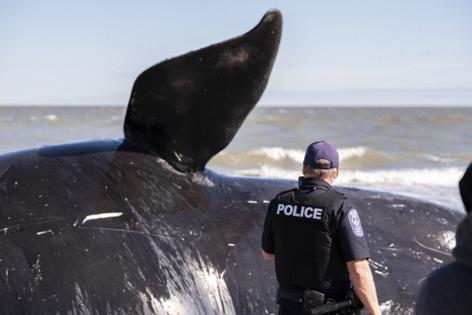North Atlantic right whale population ticks up again: 'Cautiously optimistic'
Published in Science & Technology News
The critically endangered North Atlantic right whale population has ticked up again, according to local researchers who say they’re “cautiously optimistic” about the species.
The updated population estimate for 2024 is 384 — which is a 2.1% increase from the 2023 estimate of 376.
Scientists from the New England Aquarium’s Anderson Cabot Center for Ocean Life and NOAA collaborate to calculate the estimate, factoring in calves born within the last year.
“It’s always a great feeling when we can share positive news about this critically endangered species,” said Heather Pettis, who leads the right whale research program in the Aquarium’s Anderson Cabot Center. “The slight increase in the population estimate, coupled with no detected mortalities and fewer detected injuries than in the last several years, leaves us cautiously optimistic about the future of North Atlantic right whales.
“With small population increases year to year, we still need strong protective measures for continued growth,” added Pettis, who chairs the North Atlantic Right Whale Consortium. “We don’t want to take our foot off the gas when it comes to management and conservation efforts.”
Entanglements and vessel strikes are the leading causes of serious injury and death for North Atlantic right whales.
Coming off a difficult year in 2024 with five right whale deaths, 16 entanglements and eight vessel strikes, this year has been a welcome relief. So far in 2025, scientists have logged no deaths, one new entanglement injury without attached fishing gear, and one vessel strike.
But there are still right whales from past years that remain entangled. There could also be more entanglements found later this year, as 50% of entanglements in 2024 were detected in the latter half of the year.
“Detecting entanglements is challenging as it requires two things to align: people to be looking and whales to be present in those times and locations where they’re looking,” said Philip Hamilton, a senior scientist in the Aquarium’s Anderson Cabot Center. “That’s why it is so important to have continued collaboration with state, federal, and private entities to ensure right whales are monitored throughout their range in the U.S. and Canada.”
One whale detected entangled last December far from shore is unnamed right whale Catalog #5110, which was spotted again in Cape Cod Bay in April of this year with fishing gear still attached.
Multiple organizations were involved in efforts to relocate this whale. Although the Center for Coastal Studies’ Marine Animal Entanglement Response team was able to remove a small amount of gear, the whale was left with rope caught in his mouth.
“The case of Catalog #5110 is a sad reminder of not only the persistent challenges to the survival and recovery of this species but also the prolonged suffering these individual whales endure,” Pettis said. “The effort that went into trying to assist this animal was tremendous, and yet it remains carrying a life-threatening entanglement. The ultimate goal is to prevent these entanglements from happening in the first place.”
Right whale births and new mothers are cause for celebration each year, yet the 2025 calving numbers lagged behind what researchers had hoped for.
Eleven calves were born, with four first-time mothers in the group. While most mother-calf pairs are detected in southeastern U.S. waters, two of this past season’s mothers were seen for the first time with their calves in unexpected places: “Accordion” (Catalog #4150) off New York in February and “Monarch” (Catalog #2460) in Cape Cod Bay in April.
“In recent years, right whales have been delaying giving birth to their first calf until they are older,” Hamilton said. “It is encouraging to see four of these older females join the reproductive pool this year. The future of the species rests on their broad backs.”
_____
©2025 MediaNews Group, Inc. Visit at bostonherald.com. Distributed by Tribune Content Agency, LLC.







Comments